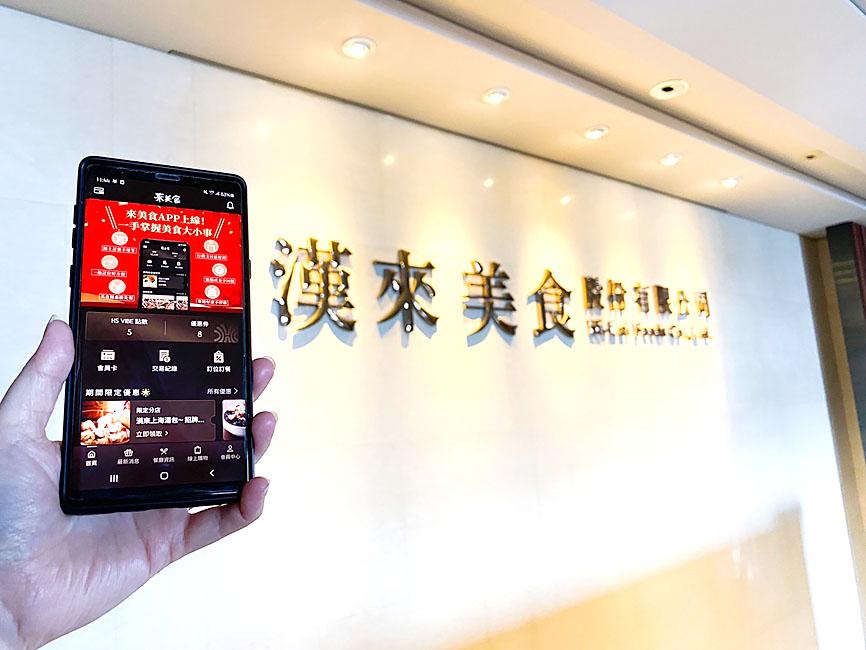Domestic restaurant chains’ revenues last month grew by double-digit percentages from a year earlier, as the negative economic effects of a COVID-19 outbreak decreased significantly.
Kaohsiung-based Hi-Lai Foods Co Ltd (漢來美食), which operates buffet restaurant brand Hilai Restaurant (漢來海港餐廳), Hi-Lai Vegetarian Restaurant (漢來蔬食), luxury Chinese restaurant Celebrity Cuisine (名人坊) and other brands, posted NT$305 million (US$10.19 million) in revenue for last month, up 59.77 percent from a month earlier and nearly 4.75 times from a year earlier.
A steady drop in COVID-19 cases allowed people to resume consumption activity, and the government easing COVID-19 pandemic control measures ameliorated fears over gathering in public.

Photo courtesy of Hi-Lai Foods Co Ltd.
The restaurant operator said it expects a further rise in business this month, as summer vacation and Father’s Day celebrations should boost food and beverage sales, it said.
Tofu Restaurant Co (豆府), which operates Korean restaurants under multiple brands, also benefited, and its revenue last month more than doubled from a year earlier to NT$238 million.
The firm’s figures returned to pre-pandemic levels and its summer operations should shore up revenue further, Tofu said.
Kura Sushi Asia Co Ltd (亞洲藏壽司), a Taiwanese subsidiary of Japanese sushi chain Kura Sushi Inc, reported NT$400 million in revenue last month, up nearly 10 times from a year earlier when a level 3 COVID-19 alert kept most people home.
The growth was the result of a surge in student customers over the summer vacation, the chain said.
Its dining business picked up substantially after the government introduced a travel subsidy to stimulate private consumption despite new COVID-19 cases hovering above 20,000 per day, it said.
Thai restaurant chain operator Tai Tong Food & Beverage Group (瓦城泰統集團) said it benefited from the hot summer season, as spicy and sour dishes help boost appetite.
Revenue last month rose by 96.86 percent to NT$430 million, the highest since the start of the pandemic, it said, adding that convenient locations in major department stores across Taiwan have helped attract foot traffic.
Restaurant and hotel operator FDC International Hotels Corp (雲品國際) reported combined revenue of NT$167 million, up 3.35 times from a year earlier.
FDC is hoping to serve foreign tourists soon, it said, adding that it expects the government to lift border restrictions.

Nvidia Corp chief executive officer Jensen Huang (黃仁勳) on Monday introduced the company’s latest supercomputer platform, featuring six new chips made by Taiwan Semiconductor Manufacturing Co (TSMC, 台積電), saying that it is now “in full production.” “If Vera Rubin is going to be in time for this year, it must be in production by now, and so, today I can tell you that Vera Rubin is in full production,” Huang said during his keynote speech at CES in Las Vegas. The rollout of six concurrent chips for Vera Rubin — the company’s next-generation artificial intelligence (AI) computing platform — marks a strategic

Enhanced tax credits that have helped reduce the cost of health insurance for the vast majority of US Affordable Care Act enrollees expired on Jan.1, cementing higher health costs for millions of Americans at the start of the new year. Democrats forced a 43-day US government shutdown over the issue. Moderate Republicans called for a solution to save their political aspirations this year. US President Donald Trump floated a way out, only to back off after conservative backlash. In the end, no one’s efforts were enough to save the subsidies before their expiration date. A US House of Representatives vote

REVENUE PERFORMANCE: Cloud and network products, and electronic components saw strong increases, while smart consumer electronics and computing products fell Hon Hai Precision Industry Co (鴻海精密) yesterday posted 26.51 percent quarterly growth in revenue for last quarter to NT$2.6 trillion (US$82.44 billion), the strongest on record for the period and above expectations, but the company forecast a slight revenue dip this quarter due to seasonal factors. On an annual basis, revenue last quarter grew 22.07 percent, the company said. Analysts on average estimated about NT$2.4 trillion increase. Hon Hai, which assembles servers for Nvidia Corp and iPhones for Apple Inc, is expanding its capacity in the US, adding artificial intelligence (AI) server production in Wisconsin and Texas, where it operates established campuses. This

US President Donald Trump on Friday blocked US photonics firm HieFo Corp’s US$3 million acquisition of assets in New Jersey-based aerospace and defense specialist Emcore Corp, citing national security and China-related concerns. In an order released by the White House, Trump said HieFo was “controlled by a citizen of the People’s Republic of China” and that its 2024 acquisition of Emcore’s businesses led the US president to believe that it might “take action that threatens to impair the national security of the United States.” The order did not name the person or detail Trump’s concerns. “The Transaction is hereby prohibited,”